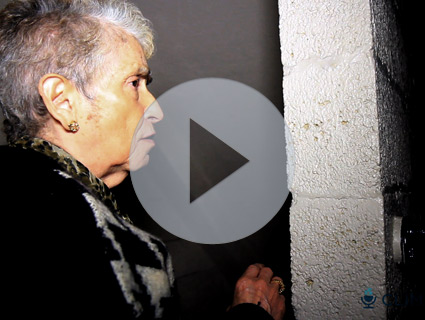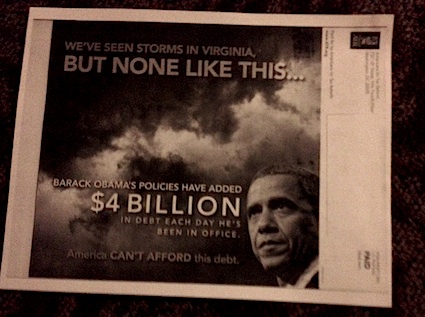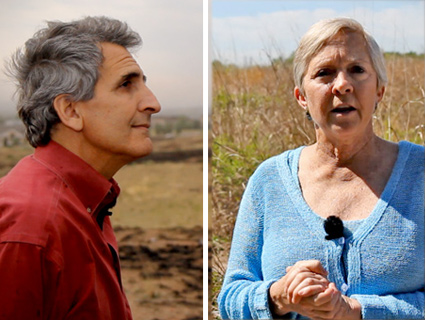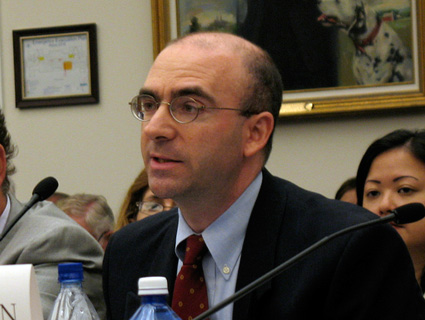(Editor’s note: The video above is an uncut version. Logistical problems in the wake of Hurricane Sandy made it impossible to get an edited video ready in time for this post. Our apologies for the somewhat unwieldy format.)
Last Thursday, a Democrat and a Republican took part in a true rarity in US politics—a 90 minute debate dedicated to the science policy issues at stake in this election, with a particular focus on climate change.
Just imagine the mirror opposite of the three 2012 presidential debates, which neglected climate change entirely—an omission that now, in the wake of superstorm Sandy, looks stunningly myopic—and you’ll get the picture.
The event, sponsored by Climate Desk Live in partnership with the nonprofit ScienceDebate.org, pitted a official Obama campaign surrogate—Kevin Knobloch, a climate and energy expert who is president of the Union of Concerned Scientists, but was representing President Obama as a private citizen—against former Republican congressman Mike Castle of Delaware. It was co-moderated by Shawn Otto, the CEO of ScienceDebate.org, and myself. (The Romney campaign was invited to participate, but declined.)
As a self-described Republican “moderate,” Castle did not clash as strongly with Obama supporter Knobloch as a staunch conservative might have. But he did defend Mitt Romney and his environmental record in Massachusetts, citing this as reason to expect a similar performance from Romney should he be elected president.
“I depend upon his good record environmentally as perhaps the step that will help bring the Republican Party to where I believe it should be,” Castle explained. [See around 20:30 in the video above.]
Knobloch challenged that idea, accusing the former Massachusetts governor of having shifted his position “fairly dramatically” on both climate and clean energy. [See around 21:00 in the video above.]
Castle also faulted the president’s leadership skills in working with Congress, and assailed the Obama administration’s clean energy investments. Citing the failed solar company Solyndra and bankrupt battery maker A123, he charged, “The bottom line is that this administration has thrown a great deal of money at something which was doomed to failure.” [Around 1:03:00 in video.]
At the same time, Castle acknowledged that his political party is perceived as having strong conflicts with science and the scientific community, particularly on climate. “The Republican Party does, I think, need adjustment on this matter,” he said. Castle noted that the summer’s extreme weather, as well as superstorm Sandy and the devastation that it caused—which Castle admitted may have been “augmented” by climate change—”are factors that may start to change some of the thinking of some of the Republicans in the Congress.” [Around 19:00 and then 56:30 in video.]
But Knobloch also faced challenges in the debate. When Otto asked him about Obama’s “climate silence,” he noted that despite “heroic efforts” early in the president’s term, legislation to address climate change “did not make it to his desk.” Knobloch went on to emphasize all of the ways that, short of legislation, the Obama administration sought to drive down greenhouse gas emissions, such as through new fuel economy standards. [Beginning around 9:30 in video.]
I asked Knobloch whether the Obama administration’s science record was as positive as it has sometimes appeared. A “scientific integrity” memorandum requested by the president very early in his term took nearly two years to produce, for instance, leading to questions about the administration’s seriousness when it comes to ensuring that government scientists are free to conduct their research and speak with the media unhindered by political actors, something the George W. Bush administration had tightly controlled—and for which it had been heavily criticized.
Although he did not speak for the Romney campaign, Castle certainly did give reasons for thinking there would be several significant science policy differences between an Obama and a Romney administration—on climate change, and on the funding of basic research.
On the first front, Castle suggested that climate is “not something that would be ignored” under Romney, “nor would it be a President Bush situation”—an administration that largely focused on research, rather than any sort of action.
Still, with cap-and-trade and carbon taxes ruled out by the candidate, when pushed by Otto, Castle did not have a sense of what Romney would actually do about climate—perhaps one reason that on the same day as the debate, President Obama’s record on climate change earned him the coveted endorsement of New York mayor Michael Bloomberg.
The second area of contrast was the funding of basic scientific research in an era of huge deficits and with the fiscal cliff pending. Would basic science—the fuel of innovation and economic growth—continue to enjoy the same level of funding, no matter who is elected…or not?
Knobloch tied candidate Romney to the Paul Ryan budget in Congress, which would have cut domestic spending so significantly that, he charged, “it’s hard to see how that would not very deeply cut basic research in science and technology.” He went on to pledge that President Obama very strongly supports basic research. [Around 1:21:00 in video.]
Castle responded by stressing that Republicans have strongly supported medical research, but added that given the fiscal cliff, many funding areas would probably suffer, from the military to, yes, science. “I don’t doubt that there would be some cuts,” he said, “but I don’t think you’re going to see drastic reductions or eliminations” to research under a Romney presidency, adding that he expected the cuts would be similar to what other discretionary spending might face. [Around 1:23:00 in video.]
In the end, the debate seemed to bespeak a less partisan, and also more substantive Washington than the one we’ve grown used to in the last four years—a Washington that might actually get things done. The question, then, is why such events are such a rarity.
Candidates for president debate the economy without being economists, and foreign policy without being diplomats. With science issues like climate change affecting nearly every aspect of life in the 21st century, why shouldn’t they also debate those? This event modeled what such a presidential debate might look like, and showed that politicians—and non-scientists working in politics—can not only talk very intelligently about science policy, but that they can also get along doing it.
“I’ve really developed a liking for Kevin,” Castle said in his closing remarks.
“I don’t agree with him,” he quickly added.












